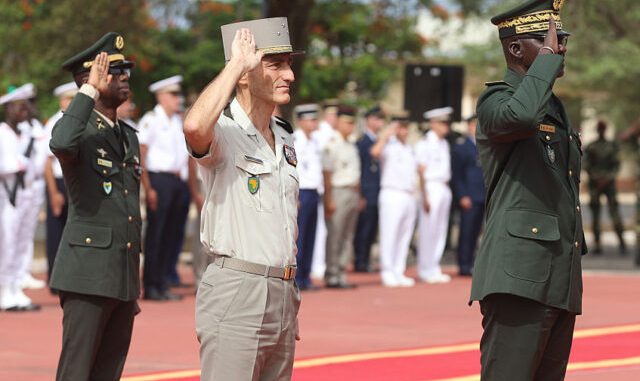
Published July 19, 2025
DAKAR, SENEGAL — France has officially withdrawn its remaining troops from Senegal, ending a decades-long military presence in West Africa that began in the colonial era and persisted through successive waves of regional crises.
The last detachment of French forces left the Ouakam military base in Dakar on Tuesday, marking the end of France’s permanent military footprint in Senegal. This follows broader military retreats from Mali, Burkina Faso, and Niger, as France continues to face increasing regional hostility and shifting political dynamics across Francophone Africa.
French Defense Minister Sébastien Lecornu confirmed the withdrawal and emphasized that France would pursue a new model of cooperation based on equal partnership. “Our military cooperation will now take new forms—without a permanent presence, and fully in accordance with the will of African nations,” Lecornu said in a statement.
End of an Era
France’s military presence in Senegal, which began shortly after the country gained independence in 1960, has long symbolized a continued post-colonial relationship. The Ouakam base in Dakar, located near the Atlantic coast, served as a logistics hub and regional headquarters for French operations in West Africa, including anti-terror missions and training exercises.
At its peak, the French detachment in Senegal housed several hundred troops and acted as a regional rapid deployment force. In recent years, however, the troop numbers dwindled to around 350. The final exit is part of President Emmanuel Macron’s reevaluation of France’s military role in Africa amid growing resentment from local populations and newly empowered nationalist governments.
Rising Anti-French Sentiment
France’s withdrawal comes amid a tide of anti-French sentiment across West Africa, especially in former colonies. In countries like Mali, Burkina Faso, and Niger—where military juntas have taken power—France was accused of meddling in internal affairs and failing to contain Islamist insurgencies despite years of intervention.
French troops were expelled from Mali in 2022, from Burkina Faso in 2023, and from Niger in 2024. These nations have since turned to alternative security partners, including Russia’s Wagner Group and Turkish and Chinese contractors, marking a clear geopolitical shift.
Although Senegal remains a democratic ally of France and did not demand the withdrawal, officials in Dakar welcomed the decision, framing it as a mutual agreement in line with Senegal’s sovereignty and modernization goals.
What Comes Next?
While France no longer maintains a permanent military base in West Africa, it has signaled intent to maintain regional ties. Cooperation will likely continue in the form of joint exercises, training, and intelligence-sharing, especially in counterterrorism operations in the Sahel and Gulf of Guinea.
French troops are still stationed in Djibouti and Gabon, though their long-term future remains uncertain as Paris reviews its entire military strategy on the continent.
Observers say the move reflects a broader European recalibration in Africa, as traditional powers adapt to rising competition from non-Western actors and a continent increasingly asserting its autonomy.
“This withdrawal is more than a tactical redeployment—it’s a symbolic end to France’s post-colonial military paradigm,” said a West African security analyst. “Now, France must find new ways to engage with Africa—ones based on respect, not dominance.”
Members of a French military flight crew talk on the tarmac at France’s military air base in Dakar, Senegal, Tuesday, June 2, 2009. (AP Photo/Rebecca Blackwell, File)
 Resulting Effects:
Resulting Effects:
Here are the resulting effects of France’s military withdrawal from Senegal — both immediate and long-term — based on the three sources and broader context:
1. Symbolic End to Post-Colonial Military Influence
France’s exit marks the closure of a significant chapter in post-colonial West Africa. For many in the region, especially in Francophone countries, French bases have symbolized ongoing foreign influence long after independence. The departure from Senegal reinforces a broader trend of African nations asserting sovereignty over military and political decisions.
2. Shift in France’s Africa Strategy
France is redefining its role in Africa from one of a permanent military power to a more hands-off, partnership-based model:
-
No more permanent bases in West Africa.
-
Focus will shift to training, intelligence-sharing, and joint operations, but only by invitation.
-
Future French military engagement will be more limited and dependent on local governments’ consent.
3. Geopolitical Vacuum & Realignment
The exit may leave a power vacuum in the region that other international players are eager to fill:
-
Russia (via Wagner Group and other proxies) has already deepened ties with military juntas in Mali, Burkina Faso, and Niger.
-
China and Turkey are also expanding economic and security footprints.
-
U.S. and EU may reassess their strategies to counterbalance the loss of French military infrastructure and influence.
4. Implications for Regional Security
Without French troops in Senegal, questions arise about:
-
Counterterrorism capacity in the Sahel and coastal West Africa.
-
The risk of jihadist groups expanding influence from the interior toward Gulf of Guinea states like Senegal, Ghana, and Côte d’Ivoire.
-
Whether local or African Union forces can effectively fill the gap.
Though Senegal is relatively stable, its proximity to volatile areas makes continued vigilance necessary.
5. Domestic Impacts in Senegal
-
National pride and political capital: The Senegalese government can tout this as a sovereignty win without antagonizing France, since it was a “mutual decision.”
-
Economic effect: The departure of French troops may slightly impact the local economy near former bases, particularly businesses that catered to military personnel.
-
Security transition: Senegal’s own armed forces will now assume full responsibility for defense previously supported by France.
6. France’s Diminishing Influence in Francophone Africa
-
France’s cultural and political influence may erode faster as military leverage declines.
-
Expect continued reassessment of other defense agreements and French-sponsored development programs.
-
The “Francafrique” model — marked by deep, often opaque, military and economic ties — appears to be effectively dismantled.
7. Boost to Pan-African and Anti-Imperialist Movements
The withdrawal will be seen as a victory by pan-Africanists and leftist movements calling for the decolonization of security and economic systems.
-
Expect increased pressure on other foreign troops (e.g., U.S., UN) in Africa.
-
May embolden regional calls for resource nationalism, currency reform (e.g., exiting the CFA franc), and institutional independence from former colonial powers.
 Bottom Line:
Bottom Line:
France’s withdrawal from Senegal is more than the end of a military deployment—it is a defining moment in the unraveling of a post-colonial legacy that has shaped West Africa’s political and security landscape for over half a century. As Paris steps back, the region enters a new era marked by rising nationalism, shifting alliances, and a growing desire for self-determination.
For France, the challenge now lies in reshaping its African policy toward respectful partnerships rather than paternalistic presence. For Senegal and its neighbors, the responsibility of maintaining stability amid global power realignments grows heavier. Whether this transition leads to greater sovereignty and security—or opens the door to new forms of foreign influence—will depend on how African nations navigate this turning point in their history.





Be the first to comment